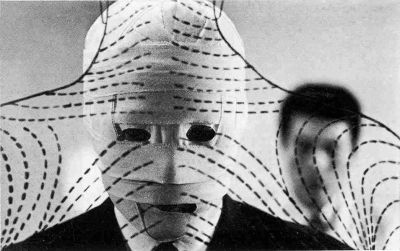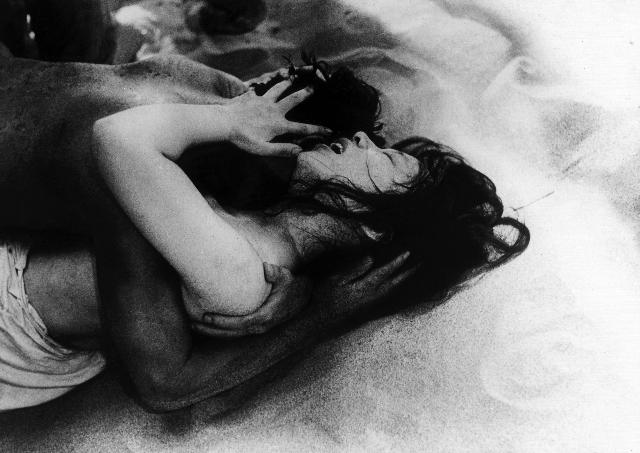
Tatsuya Nakadai searches for identity in THE FACE OF ANOTHER
THE FACE OF ANOTHER (Hiroshi Teshigahara, 1966)
Rubin Museum of Art
150 West 17th St. at Seventh Ave.
Friday, January 22, free with $7 bar minimum, 9:30
212-620-5000
www.rmanyc.org/cabaretcinema
 Japanese novelist Kôbô Abe and director Hiroshi Teshigahara collaborated on five films together, including the marvelously existential WOMAN OF THE DUNES in 1964 and THE FACE OF ANOTHER two years later. In THE FACE OF ANOTHER, Tatsuya Nakadai (THE HUMAN CONDITION, KILL!) stars as Okuyama, a man whose face has virtually disintegrated in a laboratory accident. He spends the first part of the film with his head wrapped in bandages, a la the Invisible Man, as he talks about identity, self-worth, and monsters with his wife (Machiko Kyo), who seems to be growing more and more disinterested in him. Then Okuyama visits a psychiatrist (Mikijirô Hira) who is able to create a new face for him, one that would allow him to go out in public and just become part of the madding crowd again. But his doctor begins to wonder, as does Okuyama, whether the mask has actually taken control of his life, making him as helpless as he was before.
Japanese novelist Kôbô Abe and director Hiroshi Teshigahara collaborated on five films together, including the marvelously existential WOMAN OF THE DUNES in 1964 and THE FACE OF ANOTHER two years later. In THE FACE OF ANOTHER, Tatsuya Nakadai (THE HUMAN CONDITION, KILL!) stars as Okuyama, a man whose face has virtually disintegrated in a laboratory accident. He spends the first part of the film with his head wrapped in bandages, a la the Invisible Man, as he talks about identity, self-worth, and monsters with his wife (Machiko Kyo), who seems to be growing more and more disinterested in him. Then Okuyama visits a psychiatrist (Mikijirô Hira) who is able to create a new face for him, one that would allow him to go out in public and just become part of the madding crowd again. But his doctor begins to wonder, as does Okuyama, whether the mask has actually taken control of his life, making him as helpless as he was before.
Abe’s remarkable novel is one long letter from Okuyama to his wife, filled with utterly brilliant, spectacularly detailed examinations of what defines a person and his or her value in society. Abe wrote the film’s screenplay, which tinkers with the time line and creates more situations in which Okuyama interacts with people; although that makes sense cinematically, much of Okuyama’s interior narrative, the building turmoil inside him, gets lost. Teshigahara once again uses black and white, incorporating odd cuts, zooms, and freeze frames, amid some truly groovy sets, particularly the doctor’s trippy office, and Tôru Takemitsu’s score is ominously groovy as well. As a counterpart to Okuyama, the film also follows a young woman (Miki Irie) with one side of her face severely scarred; she covers it with her hair and is not afraid to be seen in public, while Okuyama must hide behind a mask. But as Abe points out in both the book and the film, everyone hides behind a mask of one kind or another. This special screening is part of the Rubin Museum’s Walls Are Doors series and will be introduced by Harris Smith. As an added bonus, admission to the museum is free beginning at 7:00, so you can check out such exhibitions as “Visions of the Cosmos,” “The Red Book of C. G. Jung,” “Victorious Ones,” “What Is It?” and “From the Land of the Gods” before or after spending the $7 minimum at the bar that earns you a free ticket to the screening.
 Hiroshi Teshigahara’s Sisyphean tale, based on Kobo Abe’s marvelous novel, tells the story of an entomologist (Eiji Okada) out in the desert looking for insects when he comes upon a village of people living in the sand dunes — and he is unknowingly sucked into their world. Kyōko Kishida stars as the title character. See the movie — just wait till you get to the psychedelic head trip scene — but be sure to read the book as well; the scenes of the man trying to escape by climbing up the sand will feel oddly familiar to anyone who has ever been trapped in a seemingly inescapable situation. Teshigahara, who died in April 2001, adds surreal visual elements that make the film an unusually compelling though basically simple story. Abe also collaborated with Teshigahara on PITFALL (OTOSHIANA), THE FACE OF ANOTHER (TANIN NO KAO), and THE MAN WITHOUT A MAP (MOETSUKITA CHIZU). WOMAN IN THE DUNES is screening as part of Rabbitholestudio’s weekly Wednesday night film series, which features free admission and is now BYOB.
Hiroshi Teshigahara’s Sisyphean tale, based on Kobo Abe’s marvelous novel, tells the story of an entomologist (Eiji Okada) out in the desert looking for insects when he comes upon a village of people living in the sand dunes — and he is unknowingly sucked into their world. Kyōko Kishida stars as the title character. See the movie — just wait till you get to the psychedelic head trip scene — but be sure to read the book as well; the scenes of the man trying to escape by climbing up the sand will feel oddly familiar to anyone who has ever been trapped in a seemingly inescapable situation. Teshigahara, who died in April 2001, adds surreal visual elements that make the film an unusually compelling though basically simple story. Abe also collaborated with Teshigahara on PITFALL (OTOSHIANA), THE FACE OF ANOTHER (TANIN NO KAO), and THE MAN WITHOUT A MAP (MOETSUKITA CHIZU). WOMAN IN THE DUNES is screening as part of Rabbitholestudio’s weekly Wednesday night film series, which features free admission and is now BYOB.

 Japanese novelist Kôbô Abe and director Hiroshi Teshigahara collaborated on five films together, including the marvelously existential WOMAN OF THE DUNES in 1964 and THE FACE OF ANOTHER two years later. In THE FACE OF ANOTHER, Tatsuya Nakadai (THE HUMAN CONDITION, KILL!) stars as Okuyama, a man whose face has virtually disintegrated in a laboratory accident. He spends the first part of the film with his head wrapped in bandages, a la the Invisible Man, as he talks about identity, self-worth, and monsters with his wife (Machiko Kyo), who seems to be growing more and more disinterested in him. Then Okuyama visits a psychiatrist (Mikijirô Hira) who is able to create a new face for him, one that would allow him to go out in public and just become part of the madding crowd again. But his doctor begins to wonder, as does Okuyama, whether the mask has actually taken control of his life, making him as helpless as he was before.
Japanese novelist Kôbô Abe and director Hiroshi Teshigahara collaborated on five films together, including the marvelously existential WOMAN OF THE DUNES in 1964 and THE FACE OF ANOTHER two years later. In THE FACE OF ANOTHER, Tatsuya Nakadai (THE HUMAN CONDITION, KILL!) stars as Okuyama, a man whose face has virtually disintegrated in a laboratory accident. He spends the first part of the film with his head wrapped in bandages, a la the Invisible Man, as he talks about identity, self-worth, and monsters with his wife (Machiko Kyo), who seems to be growing more and more disinterested in him. Then Okuyama visits a psychiatrist (Mikijirô Hira) who is able to create a new face for him, one that would allow him to go out in public and just become part of the madding crowd again. But his doctor begins to wonder, as does Okuyama, whether the mask has actually taken control of his life, making him as helpless as he was before.